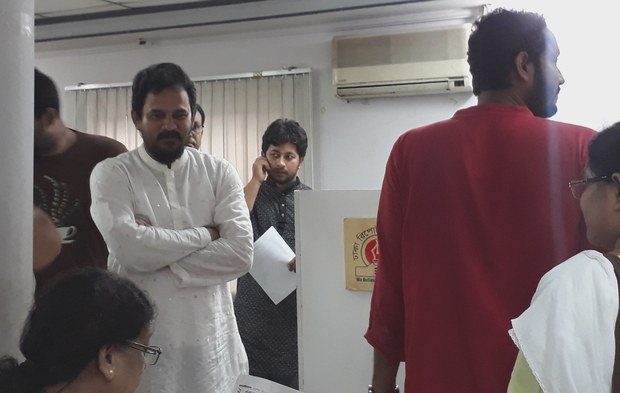Rights Groups, NGOs Urge Bangladesh to Halt Deadly Drug Campaign
2018.06.07
Dhaka
 Imran Sarkar, spokesman for the Bangladeshi grassroots movement known as Gonojagoron Moncho (Mass Awakening Platform), speaks to reporters in Dhaka, June 7, 2018.
Imran Sarkar, spokesman for the Bangladeshi grassroots movement known as Gonojagoron Moncho (Mass Awakening Platform), speaks to reporters in Dhaka, June 7, 2018.
Bangladesh faced mounting international criticism Thursday after its elite police force briefly detained and released a leader of a secular movement preparing to protest deadly anti-drug operations.
On Thursday, a day after he was interrogated and released by the Rapid Action Battalion (RAB), protest leader Imran Sarkar told reporters he was blindfolded, handcuffed and taken by plainclothes officers as his group prepared to protest in Dhaka.
“I could not see anything. I was having trouble breathing,” Sarker said. “I could not understand where I was being taken.
“They asked, why are we doing this movement? What is the purpose of this? Who is this movement against?” he said, adding that officers later explained the logic behind the government’s anti-drug operations.
Sarkar rejected authorities’ claims that his group did not apply for a permit. He showed reporters a copy of the permit application he said was submitted to the Dhaka Metropolitan Police Commission on June 5.
Previously, police told BenarNews that Sarkar, a spokesman for the grassroots movement known as Gonojagoron Moncho (Mass Awakening Platform), was invited for questioning after defying warnings not to organize a rally without a permit.
Lt. Col. Emranul Hassan, commander of RAB-3, confirmed his men interrogated Sarkar, but declined to elaborate. He denied Sarkar’s claims that he was blindfolded.
“He was brought in naturally and was naturally released after interrogation,” Hassan told BenarNews.
Death toll rises
At least 134 people branded as drug dealers or addicts have been killed in what police have described as gunfights across the country since a government crackdown began in mid-May. A home ministry official on Thursday told Reuters the death toll has risen to 140.
Authorities said all those killed died during shootouts with police or in gang wars. There have been no reports of police injuries.
Prime Minister Sheikh Hasina’s government launched the anti-drug campaign on May 15 to combat the spread of yaba, a tablet that contains methamphetamine and caffeine. Authorities estimate that about 300 million yaba pills were smuggled into Bangladesh from neighboring Myanmar last year.
On Thursday, a London-based global network of 177 non-governmental organizations that focus on drug-related issues urged the United Nations to intervene.
“Evidence worldwide has shown that such a violent and abusive approach has not managed to curb the illicit drug market, but it can be used as a political tool to win political elections and target unwanted opposition,” the International Drug Policy Consortium said in a statement, as it described the police action as “reminiscent of the Philippines drug war.”
Growing pressure
The NGO’s comments add to the growing pressure for Hasina to end her government’s anti-drug campaign.
On Wednesday, Human Rights Watch (HRW) urged Hasina to order an independent investigation into allegations of extrajudicial killings spawned by the campaign.
“While drugs are a serious problem in Bangladesh, any campaign against them should be conducted within the rule of law and avoid the use of unnecessary force,” said Brad Adams, HRW’s Asia director. “Until this spate of killings is independently investigated and proper procedures are put in place to protect the public, the campaign should be suspended.”
HRW made the statement the same day that U.N. human rights chief Zeid Ra’ad al-Hussein condemned what he described as “extrajudicial killings” that began after the government launched a “zero tolerance” campaign against illegal drugs three weeks ago.
HRW cited the killing of local councilor Akramul Haque on May 27, which had elicited widespread public outrage.
Haque’s wife, Ayesha Begum, has gone public with tapes she claims would prove that the politician was killed by RAB members. Authorities had accused Haque of being a meth dealer, which his family denied.
After Haque’s death, Mizanur Rahman, former chairman of the National Human Rights Commission, called for a magistrate’s investigation.
“Those who are involved in human rights in some way or even the ordinary people who initially supported this campaign now realize that any family may fall in danger if anybody chooses to bypass the law,” Rahman told reporters. “This incident is a clear example.”







